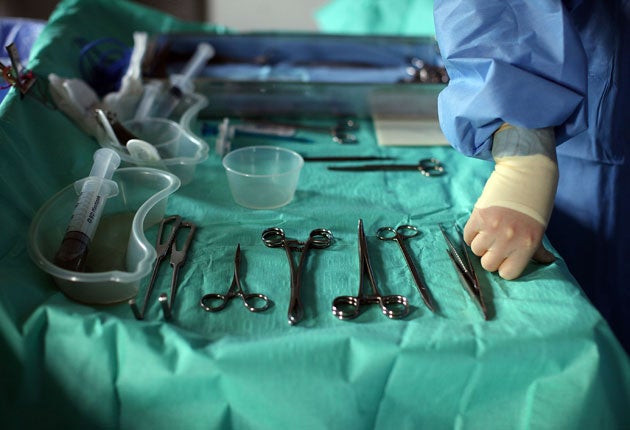NHS must 'work smarter' says Health Secretary
The listening exercise is now over and Andrew Lansley returns to the Commons to fight for his deeply unpopular NHS reform Bill

The NHS must "work smarter" and treat fewer people in large hospitals, if a financial crisis is to be averted, the Health Secretary, Andrew Lansley, has warned.
Instead, patients would receive more care and medical procedures carried out in their own homes to save money and improve care.
Stepping up his demands for reform in the face of widespread opposition and demands for his resignation, the embattled minister insisted he would not be diverted from his mission to modernise the NHS.
"I want our health service to be modern and truly world class," Mr Lansley told the IoS. "But we know that financial pressures loom large on the horizon for the health service – from our ageing population to rising costs of drugs and treatments. This is why the NHS must not only work better, but work smarter."
The bullish remarks come ahead of another tough week for the Health Secretary, whose reforms face being radically rewritten after an eight-week listening exercise ended last week. The NHS Future Forum was set up in order to quell a revolt from Lib Dems, medical professionals and patient groups. The plan to hand responsibility for commissioning £60bn of treatment to GP consortia comes as the NHS is being asked to find £20bn in efficiency savings. The King's Fund last week raised concerns about a lack of accountability under the new system.
David Cameron will return to the subject this week, with a speech setting out how the reforms will ensure the NHS survives into the future. And on Tuesday, Mr Lansley will make his first appearance in the Commons since the end of the listening exercise, to face questions about his vision for the NHS.
He will be challenged over the redundancy costs of staff at the soonto-be-axed primary care trusts and strategic health authorities, who will be responsible for emergency planning and the future of integrated cancer services if GP consortia get the go-ahead. But he remains confident that modernisation of the NHS and rethinking how care is given is the only way to ensure standards are maintained at a time of financial constraint. He highlighted a scheme providing kidney dialysis at home, developed by Manchester Royal Infirmary. As well as being more convenient for patients, it is saving the local NHS £16,430 per patient every year and has been awarded an "innovation prize" by the Department of Health. Mr Lansley said it "powerfully demonstrates how patients can benefit when you give freedom and power to those on the frontline who know best how to improve services for patients".
He added that such ideas show "how our plans to modernise our health service can work in practice, and help to safeguard the NHS for the future".
The Department of Health has also pinpointed greater use of a technique known as "enhanced recovery" as key to reducing hospital stays. Simple changes before and after operations – including preparing them mentally for treatment and quickly getting them into a routine afterwards – has had dramatic results in pilots.
It is estimated it could save £43m a year by freeing up 171,500 "bed days", with people having hip operations spending 45,000 fewer days in hospital, and knee replacement surgery needing 50,000 fewer overnight stays.
The Future Forum is now studying 15,000 responses received during the listening exercise.
Subscribe to Independent Premium to bookmark this article
Want to bookmark your favourite articles and stories to read or reference later? Start your Independent Premium subscription today.

Join our commenting forum
Join thought-provoking conversations, follow other Independent readers and see their replies